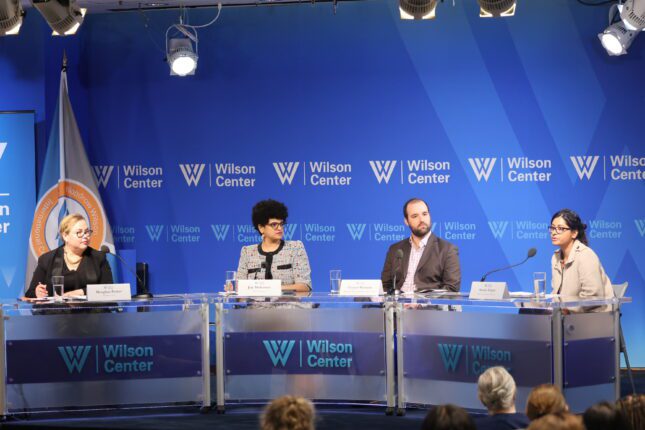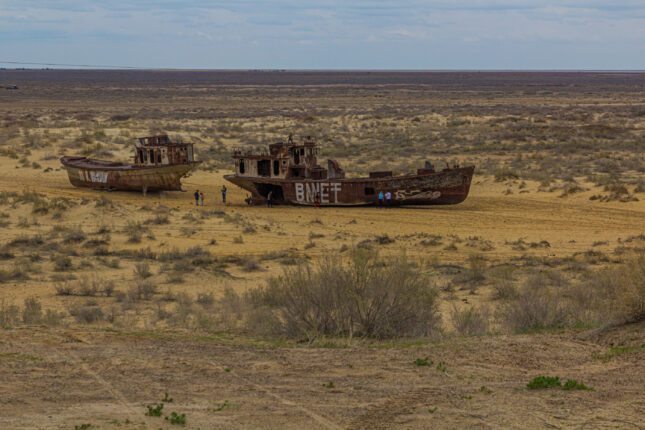-
ECSP Weekly Watch | June 24 – 28
›
A window into what we are reading at the Wilson Center’s Environmental Change and Security Program
Renewable Energy Needs a Social Vision (Mongabay)
The Zapotec of the Isthmus of Tehuantepec have accused energy giant EDF (Électricité de France) of causing human rights abuses while building wind farms in Oaxaca state. They also claim the company intimidated and harassed social movements who opposed this construction on their ancestral lands. The Zapotec are indigenous peoples of Mexico who call themselves Bën Za or “The People”—and after three years of struggle and stalling tactics by EDF’s legal representatives, French courts have authorized their civil case filing at last.
-
Flowing Together: Peace and Conflict’s Role in Socio-hydrology
›
In an era where water scarcity and disputes over water rights increasingly shape global politics, understanding the nexus between water and peace is more critical than ever. Recent events such as the border clashes between Kyrgyzstan and Tajikistan, or continued tensions between Egypt, Ethiopia, and Sudan over the Nile River’s usage, underscore the urgent need for comprehensive strategies to address both the hydrological and social dimensions of water management.
-
ECSP Weekly Watch | June 17 – 21
›
A window into what we are reading at the Wilson Center’s Environmental Change and Security Program
Brazil Joins the Rare Earth Minerals Race to Curb Chinese Dominance (Reuters)
Brazil has the world’s third-largest reserves of rare earth minerals. Yet China dominates that market, accounting for 95% of global production. The mining giant is taking steps aims to break this supply chain dominance by creating a robust rare earth industry of its own. The country’s first rare earths mine, Serra Verde, began commercial production in 2024.
-
Risks and Restoration: Land as a Driver of Conflict and Cooperation
›
Land is crucial to people’s livelihoods, health and wellbeing, culture and identity. So disputes over access to or use of land are a prominent feature in many conflicts. The Environmental Justice Atlas finds that land is at the root of conflict dynamics in approximately a third of environmentally-driven cases recorded. And because land is increasingly under threat—20-40% of global land area is degraded—the risk of conflict is increasing.
-
ECSP Weekly Watch | June 10 – 14
› A window into what we are reading at the Wilson Center’s Environmental Change and Security Program
A window into what we are reading at the Wilson Center’s Environmental Change and Security ProgramPublic Citizen, a consumer advocacy group, recently released a report outlining the plight of Latin American Indigenous communities battling against international mining corporations. The study details several examples of transgressions, including an episode from the early 2000s involving Bear Creek, a Canadian mining company awarded a license to explore Indigenous Aymara territories. Their activities sparked organized protests, road blockades, and even violent clashes with police that resulted in deaths and injuries—and forced Peru’s government to revoke Bear Creek’s license.
-
Climate Security and Europe’s Greens: A Match Made in Political Heaven?
›
When Luxembourg’s Green Party was offered the defense portfolio in coalition talks after performing strongly in the country’s 2019 elections, its senior members faced a dilemma. Never before had a party of its political stripe held that brief anywhere in the world.
Some of the Green rank and file, drawn from pacifist backgrounds, seemed uncertain as to what to make of it all. But to François Bausch, the Green politician who ultimately took on the roles of defense minister and deputy prime minister there, the answer seemed obvious. Here was an opportunity for the party to advocate for climate security from a highly relevant perch, all while showing voters that it could be trusted with such strategic concerns.
-
Environmental Journalists on the Frontlines of Democracy
›
From record-breaking heat in 2023 to alarming levels of biodiversity loss, our global climate and environmental crises pose a growing threat to human and planetary wellbeing. But even as these crises intensify, the work of documenting them has itself become increasingly risky.
Across the world, threats and attacks against journalists who report on environmental degradation and investigate environmental crimes are on the rise. A recent UNESCO survey reported 300 attacks against environmental journalists in the last five years—a 42 percent jump from the previous 5-year period.
-
The Future of Central Asian Water Diplomacy
›
Central Asia is known for its rich mineral resources and oil reserves, and its unique geographic position between Russia, China, and Iran. But it is also beginning to position itself as a potential leader in water diplomacy. This June, policymakers, academics, and those in the private sector will convene in Tajikistan for the Dushanbe Water Process. In partnership with the United Nations, the country is hosting biennial conferences between 2018-2028; this June will mark the third international high level conference on the topic.
Showing posts from category environmental security.









